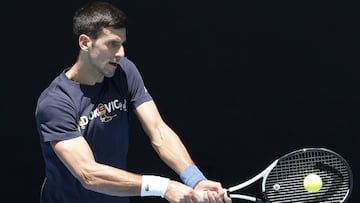Novak Djokovic: could the world number one be deported from Australia?
Djokovic continues to train ahead of the Australian Open in Melbourne, while the government decide on whether to deport the tennis star.


Novak Djokovic said "human error" was behind a mistake on his documents for entry to Australia that breached its strict laws on reporting recent travel.
Djokovic had his visa restored by the federal circuit court on Monday but his ability to stay in Australia was put in doubt by the ministerial review. It was then revealed on Tuesday that the Australian Border Force was investigating his pre-flight declaration after images emerged suggesting Djokovic was in the Serbian capital, Belgrade, less than two weeks before his flight from Spain to Australia on 4 January.
On Wednesday, while the Australian government considered whether to deport the tennis star from the country, Djokovic admitted mistakes happened with his travel documents for the country hosting the Open. Djokovic's travel declaration was filled in by his support team, who made an "administrative mistake" when they ticked the "no" box in response to whether he had travelled elsewhere in the 14 days before arriving in Australia, according to the 34-year-old.
"This was human error and certainly not deliberate," Djokovic said in a post on Instagram. "We are living in challenging times in a global pandemic and sometimes these mistakes can occur."
STATEMENT BY NOVAK DJOKOVIC
— Novak Djokovic (@DjokerNole) January 12, 2022
12 January 2022https://t.co/qhreHUYlQ8
Giving false or misleading information on the form is an offence, carrying a maximum penalty of 12 months in prison, and a fine of up to A$6,600 ($4,730) and can lead to cancellation of the offender's visa. In Australia, they have a policy barring non-citizens or non-residents from entry unless they are fully vaccinated against covid-19 but offers a medical exemption. The world number one's visa was cancelled on the grounds he has not been vaccinated and his medical exemption was not satisfactory.
Djokovic admits errors
Djokovic has also apologised in his statement on social media for attending an interview with French newspaper L'Équipe for a photoshoot on 18 December, the day after he said he had tested positive for covid-19.
"While I went home after the interview to isolate for the required period, on reflection, this was an error of judgement and I accept that I should have rescheduled this commitment," Djokovic said.

Could Djokovic be deported?
Judge Anthony Kelly says that if Djokovic was to be deported through an order from immigration minister Alex Hawke, he could be barred from Australia for three years. He told the court in no uncertain terms that if the government does consider this motion, he must be given ample notice to prepare for future proceedings. Until then, the Serb is free to stay in Australia and participate at the Open, which begins on 17 January. A spokesperson for Hawke, said he was still considering use of his personal power to cancel Djokovic’s visa.
"Mr Djokovic’s lawyers have recently provided lengthy further submissions and supporting documentation said to be relevant to the possible cancellation of Mr Djokovic’s visa,” he said on Wednesday. “Naturally, this will affect the timeframe for a decision."
Greatest of all time
Related stories
The Australian Open could see him crowned the greatest male tennis player of all time. Djokovic trained yesterday and today in preparation for the tournament. It's now up to the Australian government to decide if he can take part in the Open, which starts in just five days.
Follow all the latest on the Djokovic case

